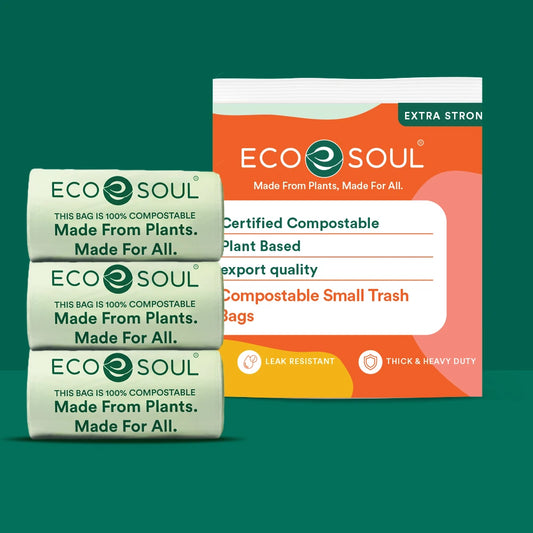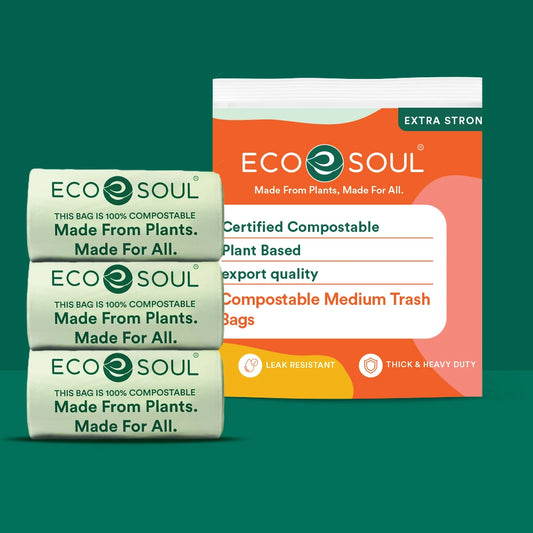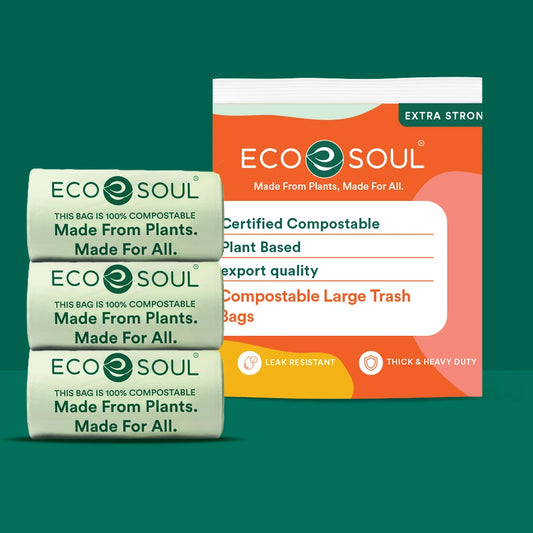Compostable Garbage Bags
People all over the world are realizing the negative impact that single-use plastics have on the planet and how small changes in our habits can have big results. One of the easiest changes to create an impact is to change a common household item: garbage bags. Most traditional garbage bags are made from plastic, and while garbage bags make it very easy to put all of your kitchen food waste or household waste into them, they are terrible for the environment. They are infinite, taking hundreds of years to decompose, are toxic, and release harmful microplastics into the environment while decomposing.
Compostable garbage bags, on the other hand, are made of plant materials like PLA or cornstarch. They feel, look, and act just like plastic bags, but are compostable, which means they will not stay around in the environment.
Why Choose Compostable Garbage Bags Over Plastic?
The problem of plastic pollution has reached alarming levels. Plastic bags never completely vanish from nature. They disintegrate into microplastics that pollute soil, streams, and the air we breathe. Animals or marine life often mistakenly take plastic to be food, causing choking, entanglement and even death. Selecting compostable substitutes reduces the need for petroleum-based plastics, which will alleviate more lasting pollution effects.
Plant-Based: Compostable garbage bags are made from PLA or cornstarch, which is a renewable resource, unlike plastic garbage bags which are made from non-renewable fossil fuels.
Break Down Naturally: After disposing of them, they break down into compost after disposal in a compost bin. These bags are labelled as industrial compostable, and can take somewhere around 90-180 days to break down in a composting facility.
Reduced Carbon Footprint
Plant-based bags are generally less energy-intensive and have lower greenhouse gas emissions in the production process than traditional plastics.
More Efficient for Composting Programs
If you are already composting food scraps, a compostable bag makes the process much easier and cleaner. For responsible disposal, dispose of them in a compost bin and get in touch with your local composting facilities. These bags are certified compostable under an industrial composting facility.
Benefits of Using Compostable Kitchen Garbage Bags
Switching to compostable garbage bags will provide more than just an environmental benefit. Here’s what you'll notice when you switch at home or in your workplace:
1. Odor Control
Cornstarch garbage bags are naturally breathable, which reduces moisture and bacteria, locking in that filthy odor.
2. Strength and Durability
Some people mistake compostable items for being fragile. However, these high-quality cornstarch bags are astonishingly resilient.
3. No Toxic Residue
There are no harmful byproducts when compostable bags break down. You just have organic matter. This makes them safe to use in your garden, community composting projects, and commercial composting locations.
4. Ease of Waste Management
If you are in a municipality that has a compost collection, your compostable bags are likely allowed for curbside pick up - mainly because they are less messy and cleaner for transporting food scraps.
5. Great for Eco-Conscious Households and Businesses
From restaurants to offices, it is a visible and practical option to switch to compostable garbage bags to prove environmental responsibility. Customers notice these things, and using compostable garbage bags will help you enhance your brand's eco image.
How to Properly Use and Dispose of Composting Garbage Bags?
It's easy to use compostable trash bags, and there are a few basic steps that will help you maximize your compostable trash bag experience.
First, store them in a cool, dry place; this will help maintain their strength and efficacy. Follow any guidelines you see for using them within a particular timeframe.
Second, when you're filling them, don't pack them super full with food scraps; always leave some space to tie the bags securely. Leaving some air space in the bag allows the bag to be carried more comfortably and makes it safer for the consumer to dispose of, similar to when they can be dropped directly into a home compost bin or are collected via municipal organics or green waste collection.
Third, if you are collecting wet kitchen scraps (especially if at or close to the end), adding some paper at the bottom and/or some food waste will help keep the organics a bit more balanced.
Finally, when you have finished filling them, they can be placed in an industrial composting facility, which is offered via municipal or community collection services. They will break down along with the other organic scraps. The compostable garbage bags can go to a landfill with or without food waste, knowing they will decompose quickly and return to the earth over time.
Compost Garbage Bags vs. Biodegradable Bags – What’s the Difference?
Compostable garbage bags and biodegradable bags may sound alike but differ. Compostable bags are made from plant materials, like cornstarch, and break down completely into natural elements (water, carbon dioxide, and organic matter) with no harmful parts in composting conditions. Compostable bags will be completely turned into compost that can be used with food and garden waste in compost systems.
Biodegradable bags may include plant-based material, plastic, or both plant-based materials and plastic. Biodegradable bags will still decompose over time, but may not completely decompose and may leave behind plastic particles for an unknown duration, depending on the material it was made of. The major distinction is compostable bags labelled with an expectation that the bag will break down in the environment, while biodegradable bags can only be expected to break down over time.
Conclusion
Switching to compostable cornstarch garbage bags is one of those easy but impactful actions that you can take to lessen your negative impact on the environment. Compostable plastic garbage bags are tough enough to hold daily trash, fit into compost systems, and are made to degrade naturally in the environment (not like plastic that takes thousands of years to degrade).
When buying the compostable bags for your garbage can, always buy the size you need for the container, store them properly, clean and dry, so that they are fit for use when it is time to put the garbage out. These bags come in three different sizes: Small (17" x 19"), Medium (19" x 21") & Large (24" x 32").
When buying the compostable bags for your garbage can, always buy the size you need for the container, store them properly, clean and dry, so that they are fit for use when it is time to put the garbage out. Use the bags within their shelf life, composting when possible, and every bag that you switch from plastic to compostable also removes some unwanted waste from harming the environment, and helps with creating a cleaner future!
You are not just taking out your trash; you are also taking a little bit out of the world's waste problem.
FAQs:
Compostable garbage bags are made up of plant-based materials such as PLA or Cornstarch, which are renewable resources. |
Cornstarch garbage bags are made from renewable resources, which decompose naturally in the environment within a few weeks, enriching nutrients to the soil. Plastic garbage bags are made from non-renewable resources, which do not break down easily in the environment and remain in the environment for centuries. |
Yes, our compostable kitchen garbage bags are free from any chemicals or toxins, so it is safe for food waste. |
Yes, you can use eco-friendly garbage bags for general food waste. |
Compost garbage bags take a few weeks to decompose completely in the environment. |
EcoSoul Home’s compostable garbage bags are made from plant-based materials like PLA or cornstarch, which break down into organic matter easily in just a few weeks. They are strong, sturdy, odor-free, and do not release any toxins. |
Certified For Your Peace Of Mind
We believe that certifications are vital to transparency and the overall health of our planet. That’s why we always validate our products to ensure that they’re better for people and the environment.
While not every certification is appropriate for every product, we go to the ends of the Earth to attain the right certifications for the right materials — so you can have peace of mind that you’re doing right by the planet.









